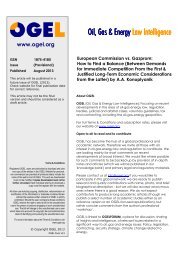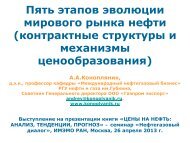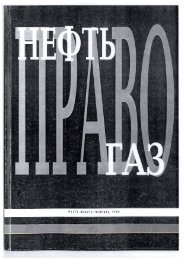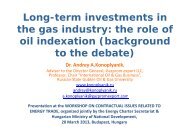Pipelines, politics and power: The future of EU-Russia energy
Pipelines, politics and power: The future of EU-Russia energy
Pipelines, politics and power: The future of EU-Russia energy
Create successful ePaper yourself
Turn your PDF publications into a flip-book with our unique Google optimized e-Paper software.
10 <strong>Pipelines</strong>, <strong>politics</strong> <strong>and</strong> <strong>power</strong><br />
<strong>and</strong> continue to develop <strong>and</strong> manage their resources independently,<br />
to maximise the rents they collect. <strong>The</strong>y might not wish to ‘unbundle’<br />
(that is, break up) their vertically-integrated companies 48 , nor grant<br />
48 <strong>The</strong> original draft <strong>of</strong> the <strong>EU</strong>’s Third m<strong>and</strong>atory third-party access to their<br />
Gas Directive from September 2007<br />
<strong>energy</strong> infrastructure because this can<br />
would have made it illegal for <strong>energy</strong> complicate project financing. 49<br />
p r o d u c e r s / i m p o r t e r s t o a l s o own<br />
t r a n s m i s s i o n a n d d i s tr i b u t i o n Instead, they may prefer negotiated<br />
systems. In June 2008, <strong>EU</strong> <strong>energy</strong> third-party access, which was the rule<br />
ministers agreed that vertically in the <strong>EU</strong> before it adopted the<br />
integrated <strong>energy</strong> companies could Second Gas Directive in 2003. But<br />
retain ownership <strong>of</strong> pipelines <strong>and</strong> while <strong>Russia</strong> <strong>and</strong> other big gas<br />
<strong>power</strong> grids, provided they run them as<br />
suppliers to the <strong>EU</strong> reject<br />
a strictly separate businesses. This<br />
harmonisation on the basis <strong>of</strong> the<br />
compromise, however, was vetoed by<br />
the European Parliament. acquis, most <strong>of</strong> them are either<br />
members or observers <strong>of</strong> the ECT (see<br />
49<br />
Virtually all major capital-intensive map page 114). In terms <strong>of</strong> <strong>energy</strong><br />
<strong>energy</strong> infrastructure projects in the<br />
market liberalisation, the ECT does<br />
<strong>EU</strong> (gas pipelines, inter-connectors,<br />
not go as far as <strong>EU</strong>’s Second Gas<br />
LNG terminals <strong>and</strong> regasification<br />
plants) are financed on the basis <strong>of</strong> a Directive. It stays at the level <strong>of</strong><br />
derogation A second from m<strong>and</strong>atory – but equally third-party unpromising liberalisation – approach required is to by incorporate the First<br />
access.<br />
some <strong>of</strong> the ECT principles into Gas the Directive <strong>energy</strong> section from 1998. <strong>of</strong> the new PA.<br />
This idea was first voiced by some <strong>Russia</strong>n <strong>of</strong>ficials, then echoed by<br />
some <strong>of</strong> their European colleagues. But no-one has clarified how this<br />
would work in practice <strong>and</strong> how ECT principles would be worded<br />
in the new <strong>EU</strong>-<strong>Russia</strong> treaty. <strong>The</strong>re is a risk that two different<br />
st<strong>and</strong>ards for applying ECT principles would emerge, which may be<br />
especially tricky for the different dispute settlement procedures <strong>of</strong><br />
the two treaties. Moreover, negotiating a new multilateral agreement<br />
(between <strong>Russia</strong>, the <strong>EU</strong> <strong>and</strong> its 27 members) ‘based on ECT<br />
principles’ would be no less lengthy <strong>and</strong> complicated than resolving<br />
the remaining issues relating to the ECT <strong>and</strong> the Transit Protocol.<br />
This is especially so since whatever the <strong>EU</strong> <strong>and</strong> <strong>Russia</strong> agree in the<br />
PA talks cannot fall behind the ECT. <strong>The</strong> ECT is part <strong>of</strong> the acquis<br />
Regulating <strong>energy</strong> relations: Acquis or Energy Charter 1<br />
in the sense that it represents the minimum st<strong>and</strong>ard <strong>of</strong> liberalisation<br />
for its members (the equivalent <strong>of</strong> the First Gas Directive). Individual<br />
ECT member-states can <strong>of</strong> course go further in developing more<br />
open <strong>and</strong> competitive markets, as the <strong>EU</strong> did when it adopted the<br />
Second Gas Directive.<br />
<strong>The</strong>re is therefore only one realistic way to create a common <strong>Russia</strong>-<br />
<strong>EU</strong> <strong>energy</strong> space: on the basis <strong>of</strong> the existing, mutually acceptable<br />
‘common denominator’ that is the ECT. Only in this case will the<br />
<strong>Russia</strong>-<strong>EU</strong> <strong>energy</strong> space be compatible with the common rules <strong>of</strong> the<br />
emerging Eurasian <strong>energy</strong> market. This market today comprises 51<br />
ECT member-states <strong>and</strong> 20 observers in Europe, Asia <strong>and</strong> North<br />
Africa which are connected by pipelines <strong>and</strong> electricity grids <strong>and</strong> other<br />
<strong>energy</strong> infrastructure. <strong>The</strong> <strong>energy</strong> section <strong>of</strong> the 50 In this case, the date on<br />
new PA could then be very brief. It could just which the <strong>energy</strong> chapter<br />
<strong>of</strong> the new PA becomes<br />
mention that the legal framework <strong>of</strong> the common<br />
<strong>Russia</strong>-<strong>EU</strong> <strong>energy</strong> space “shall include the ECT”,<br />
which would mean that in substance the <strong>Russia</strong>-<br />
<strong>EU</strong> <strong>energy</strong> space could go beyond the ECT. 50<br />
effective should be linked<br />
to <strong>Russia</strong>’s ECT<br />
ratification.<br />
Rather than trying to resolve <strong>energy</strong> differences in the framework <strong>of</strong><br />
the PA negotiations, the <strong>EU</strong> <strong>and</strong> <strong>Russia</strong> should focus on resolving<br />
<strong>Russia</strong>’s substantive concerns so that it feels able to ratify the ECT.<br />
Informal consultations between <strong>Russia</strong> <strong>and</strong> <strong>EU</strong> experts held in 2005-<br />
06 have already resulted in some possible solutions for the draft<br />
Transit Protocol. But there are still some difficult outst<strong>and</strong>ing issues.<br />
While there has been some progress on the draft Transit Protocol,<br />
<strong>Russia</strong> began to indicate new concerns regarding ECT ratification,<br />
without, however, presenting an exhaustive list <strong>of</strong> such concerns.<br />
This ‘open list’ has made it all but impossible for the <strong>EU</strong> <strong>and</strong> <strong>Russia</strong><br />
to agree on a balanced compromise for both the Transit Protocol<br />
<strong>and</strong> <strong>Russia</strong>’s ECT ratification.<br />
<strong>Russia</strong>, meanwhile, is concerned about the <strong>EU</strong>’s unwillingness to<br />
apply the multilateral Transit Protocol within its own borders.












